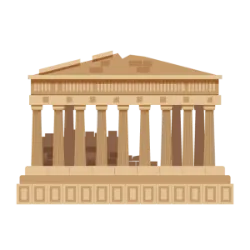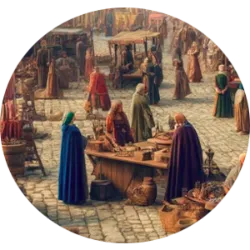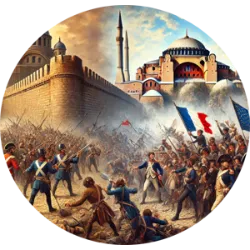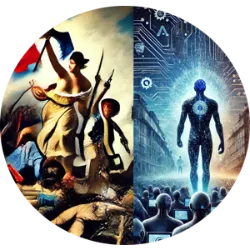The Rise of Greek Civilization
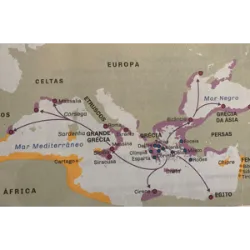
Greece is located on the Balkan Peninsula and is washed by the Mediterranean Sea. Its civilization emerged from the 8th century BC, having its roots in mainland Greece, the islands of the Aegean Sea and the coasts of Asia Minor. It later expanded to the shores of the Mediterranean Sea, establishing colonies that contributed to economic and cultural links.
Formation, Structure and Cultural Unity

Greece is marked by its mountains, with few plains and a coastline full of gulfs and bays. The climate is predominantly dry, with hot summers. This geography, combined with rivalries between Greek groups, resulted in the formation of city-states, or polis, each with its own government, army and laws, which contributed to the isolation of populations.
Each city-state Greek was divided into three parts:
- The acropolis, located on a hill surrounded by walls, housed public and religious buildings;
- The urban area, with housing neighborhoods and a central square called the agora, used for commerce and meetings;
- The surrounding countryside, with farmland and pastures to supply the city.
Despite political differences, city-states such as Athens, Sparta and Corinth shared language, religion, customs and games, creating a sense of unity among the Greeks.
Test yourself with one of these challenges 👇
You can still go deeper with those who are experts in the subject: História do mundo
Discover some interesting facts about Ancient Age
Emergence of Monetary Economy
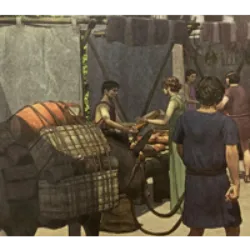
Despite the poor soil in Athens, agriculture was the main activity for the majority of the population, who cultivated wine, olive oil, cereals, honey and practiced livestock farming. In handicrafts, they produced ceramics, objects and were involved in metallurgy to manufacture weapons, in addition to shipbuilding. Located on the Attica Peninsula and close to the port of Piraeus, Athens prospered from trade along the Mediterranean and Black Seas. Initially based on direct exchange, trade gradually adopted the use of currency (drachma), facilitated by the silver mines in Athens that allowed coinage to be minted.
Athens emerged as the most powerful city in the Greek world due to its prosperous economy commercial, maritime and monetary, developing a robust naval and commercial fleet. The agora, a public space that functioned as the city's economic, social and political center, housed the market where currency was widely used.
Athenian society was formed as follows: Citizens: male individuals, free

Athenian society was formed as follows:
Citizens: male individuals, free, over 20 years old, children of an Athenian father and mother, who performed military service, had political rights and land. They corresponded to around 10% of the population of Athens;
Metecos: Free foreigners who resided in Athens, without political or civil rights, but obliged to perform military service and pay taxes. They generally dedicated themselves to crafts and commerce and could not own land;
Slaves: The most numerous group without rights, they carried out heavy tasks such as work in mines, domestic work or construction of public works, and were generally prisoners of war.
Athenian society was marked by profound inequalities, where citizens held political and property privileges, while slaves were treated as commodities devoid of individual rights.
In the 5th century BC, in Athens, democracy was born

In the 5th century BC, in Athens, democracy was born, a political regime where all citizens are free and equal before the law. Cleisthenes was its founder and Pericles consolidated it, allowing everyone to participate in political life and granting remuneration to the poorest.
The main bodies of power were:
Ecclesia (or Assembly of the people): formed by all citizens, approved laws, appointed magistrates and decided on issues of war and peace;
Bulé (or Council of Five Hundred): drafted laws to be approved by the Ecclesia;
Helieu: judged most public and private issues;
Aerópago: responsible for judging homicide crimes and religious issues.
The originality of Athenian democracy lies in the fact that it
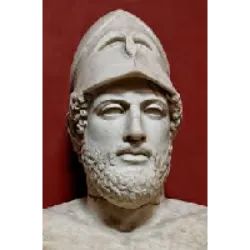
The originality of Athenian democracy lies in the fact that it is a direct democracy, that is, all citizens participate in the government of the polis through their participation in the Ecclesia, without the existence of representatives. However, it had contradictions: only citizens had political rights, excluding metics (foreigners), women and slaves. Furthermore, there were restrictions on freedom of expression, such as ostracism (expulsion from the city-state of Athens for 10 years) and the death penalty (an aspect that is not acceptable in light of current democracy). Athens also exercised imperialism over the city-states allied with the Delian League (a defensive alliance of city-states against the Persians). Despite its limitations, it inspired current democracies. Using the comparative method between the Athenian government and current democratic governments, showing an evolution over time, having its origins in Ancient Greece.
Artistic manifestations constitute one of the most
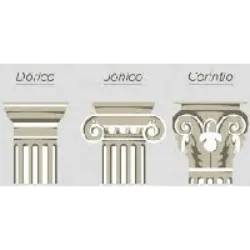
Artistic manifestations constitute one of the most significant aspects of Greek civilization. Greek art, known as classical art, reached its peak in the 5th and 4th centuries BC, profoundly influencing European culture at different times. Art is closely linked to religion, through the construction of temples, sculptures and paintings. Its main characteristics were perfection, balance, order and harmony of forms. Art is tailored to man, that is, the artist's main concern was to value and enhance the characteristics of the human being. The Greeks defended the idea that even useful things must be beautiful to awaken the feeling of admiration, therefore, even in everyday objects, they sought to awaken admiration and respect.
Test yourself with one of these challenges 👇
HOME
